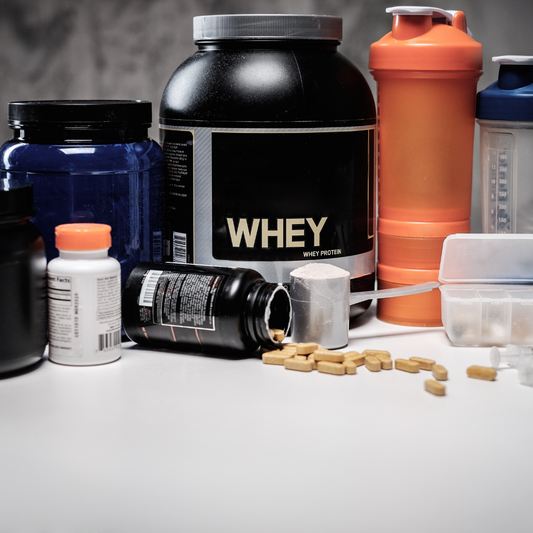In the world of protein supplements, two contenders often emerge as the most popular choices: whey protein and pea protein. Whether you're a seasoned athlete, a fitness enthusiast, or someone just starting their fitness journey, understanding the differences between these two protein sources is crucial for optimizing your nutrition.
In this comprehensive guide, we'll delve into the details of pea protein vs. whey protein, comparing their benefits, nutritional profiles, and ideal use cases. By the end of this article, you'll have all the information you need to choose the best protein supplement for your needs.
What is Whey Protein?
Whey protein is derived from milk during the cheese-making process. It's a complete protein, meaning it contains all nine essential amino acids that the body cannot produce on its own. Whey protein is renowned for its high biological value (BV) and rapid digestion rate, making it a favorite among athletes for post-workout recovery.
Nutritional Profile of Whey Protein
Whey protein is packed with essential nutrients. A typical serving (around 30 grams) of whey protein isolate contains:
- Calories: 120
- Protein: 24 grams
- Fat: 0.5 grams
- Carbohydrates: 2 grams
- BCAAs: 5.5 grams (Branched-Chain Amino Acids: Leucine, Isoleucine, Valine)
Amino Acid Profile
Whey protein is a complete protein, boasting all nine essential amino acids. These are:
- Histidine: Important for growth and tissue repair.
- Isoleucine: Involved in muscle metabolism and immune function.
- Leucine: Key for muscle protein synthesis.
- Lysine: Crucial for protein synthesis and hormone production.
- Methionine: Essential for metabolism and detoxification.
- Phenylalanine: Precursor for neurotransmitters.
- Threonine: Important for immune function and collagen production.
- Tryptophan: Precursor for serotonin.
- Valine: Promotes muscle growth and tissue repair.
Benefits of Whey Protein
-
Muscle Growth and Repair: Whey protein's high BV means it's efficiently used by the body for muscle protein synthesis. According to a study published in the American Journal of Clinical Nutrition, whey protein supplementation significantly increases muscle protein synthesis, aiding muscle growth and repair.
-
Rapid Absorption: Whey protein is quickly absorbed, making it ideal for post-workout recovery. Its quick digestion ensures that amino acids are rapidly delivered to muscles.
-
Weight Management: Whey protein can promote weight loss by increasing satiety. A study in the Journal of the American College of Nutrition found that whey protein can help reduce body fat and preserve lean muscle mass during weight loss.
What is Pea Protein?
Pea protein is derived from yellow split peas. It's a plant-based protein that's gaining popularity, especially among vegans and those with lactose intolerance or dairy allergies. Pea protein is hypoallergenic, making it a suitable option for many individuals.
Nutritional Profile of Pea Protein
A typical serving (around 30 grams) of pea protein isolate contains:
- Calories: 120
- Protein: 23 grams
- Fat: 2 grams
- Carbohydrates: 1 gram
- BCAAs: 4.5 grams
Amino Acid Profile
Pea protein, while nearly complete, is slightly lower in the amino acid methionine. However, it still provides a broad spectrum of essential amino acids:
- Histidine: Supports tissue growth and repair.
- Isoleucine: Aids muscle metabolism and immune function.
- Leucine: Crucial for muscle protein synthesis.
- Lysine: Important for protein synthesis and enzyme production.
- Methionine: (Lower in pea protein) Necessary for metabolism and detoxification.
- Phenylalanine: Precursor for tyrosine and neurotransmitters.
- Threonine: Involved in immune function and collagen production.
- Tryptophan: Precursor for serotonin and melatonin.
- Valine: Supports muscle growth and repair.
Benefits of Pea Protein
-
Hypoallergenic: Pea protein is free from common allergens such as dairy, soy, and gluten, making it suitable for individuals with food sensitivities.
-
Sustained Energy: Pea protein is digested more slowly than whey protein, providing a steady release of amino acids over time. This can help sustain energy levels throughout the day.
-
Muscle Growth and Recovery: A study published in the Journal of the International Society of Sports Nutrition found that pea protein is as effective as whey protein in promoting muscle thickness when combined with resistance training.
Comparing Pea Protein and Whey Protein
Protein Quality and Amino Acid Profile
Whey protein is a complete protein with a high biological value. Pea protein, while nearly complete, is slightly lower in the amino acid methionine. However, this can be easily compensated by combining it with other protein sources such as rice protein.
Digestion and Absorption
Whey protein is known for its rapid absorption, making it ideal for post-workout recovery. Pea protein, on the other hand, is digested more slowly, providing a prolonged release of amino acids.
Allergenicity
Whey protein, being derived from milk, may not be suitable for those with lactose intolerance or dairy allergies. Pea protein is hypoallergenic and free from common allergens, making it a safer choice for individuals with food sensitivities.
Environmental Impact
Pea protein has a lower environmental impact compared to whey protein. The production of pea protein requires fewer resources and generates less greenhouse gas emissions. This makes pea protein a more sustainable choice.
Ideal Use Cases
Whey Protein
- Post-Workout Recovery: Due to its rapid absorption, whey protein is ideal for consuming immediately after a workout to kickstart muscle recovery.
- Muscle Building: Its high BCAA content, particularly leucine, makes whey protein highly effective for muscle protein synthesis.
- Weight Management: Whey protein's ability to promote satiety can aid in weight loss and body composition goals.
Pea Protein
- Meal Replacement: The slow digestion rate of pea protein makes it suitable for meal replacement shakes, providing sustained energy and satiety.
- Hypoallergenic Option: Ideal for individuals with lactose intolerance, dairy allergies, or other food sensitivities.
- Environmental Consciousness: Those looking to reduce their environmental footprint can benefit from choosing pea protein over whey.
Conclusion
Both pea protein and whey protein have their unique benefits and are effective in supporting muscle growth, recovery, and overall health. Your choice between the two will depend on your dietary preferences, digestive tolerance, and environmental considerations. By understanding the differences and benefits of each, you can make an informed decision that aligns with your health and fitness goals.
References
- American Journal of Clinical Nutrition: Study on whey protein and muscle protein synthesis.
- Journal of the American College of Nutrition: Research on whey protein and weight management.
- Journal of the International Society of Sports Nutrition: Study on pea protein and muscle thickness.


















